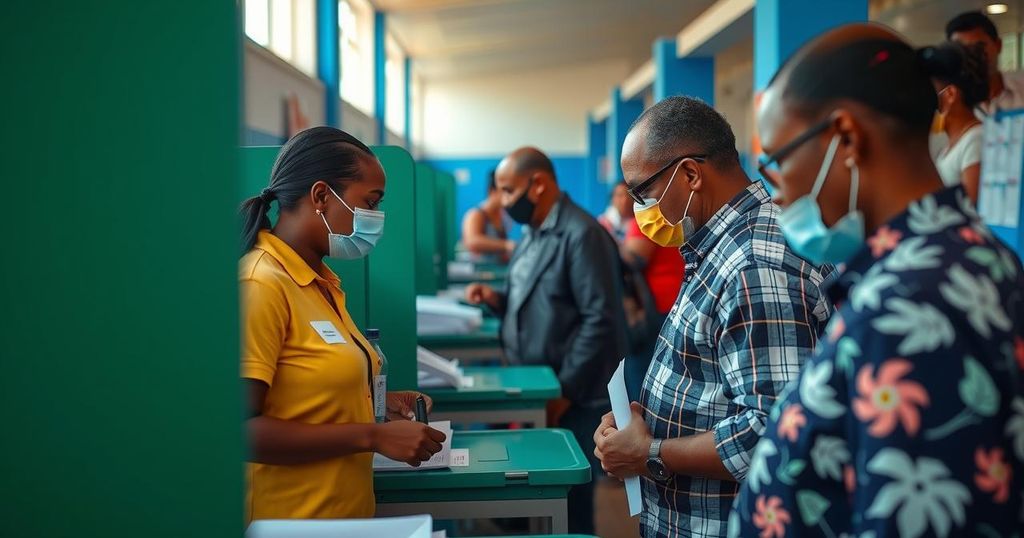Mauritius conducted parliamentary elections amid a phone-tapping scandal, impacting Prime Minister Pravind Jugnauth’s campaign. Significant voter turnout was reported as both Jugnauth and former Prime Minister Navin Ramgoolam expressed confidence in winning. Concerns over governance and corruption remain pressing, particularly after Mauritius dropped in the Ibrahim Index. Results are anticipated soon, with the implications for democratic stability and economic growth at stake.
Mauritius held parliamentary elections on Sunday amidst heightened tensions stemming from a phone-tapping scandal. This vote is pivotal, focusing on maintaining economic and political stability in the Indian Ocean nation, which is seen as one of Africa’s most prosperous democracies. The election follows a significant territorial agreement in which Britain conceded sovereignty of the Chagos Islands to Mauritius. Prime Minister Pravind Jugnauth, who is seeking re-election, faced challenges as leaked recordings of conversations involving politicians and journalists emerged prior to the polls, overshadowing his administration’s achievements. Despite efforts to restrict social media due to the scandal, this move was reversed in response to public and media backlash, raising concerns about the erosion of democratic freedoms in the country. Voters were divided between Jugnauth’s Militant Socialist Movement and the opposition Alliance of Change, led by former Prime Minister Navin Ramgoolam. Both factions are optimistic about their chances, with promises to alleviate poverty and address living costs. By one hour before polling closed, the electoral commission reported a 70 percent voter turnout. Security was heightened, with police maintained at polling stations, and observers from the African Union monitored the proceedings. Ramgoolam raised alarms about potential electoral fraud but noted that the voting atmosphere remained largely peaceful. Stability remains a pressing issue in Mauritius, as concerns over governance and increased corruption have emerged following a decrease in the effectiveness of institutional checks and balances. The nation’s impressive economic performance, highlighted by a reported seven percent GDP growth in 2023, raises calls for diversification amid critical comments regarding the political system’s transparency. Following a decline in its standing in the Ibrahim Index, questions persist about the long-term stability of Mauritius’s democratic institutions, especially given the historical context of political leadership rooted in three prominent families since independence. While the Chagos Agreement is celebrated, apprehensions linger regarding the impact of international military agreements on national sovereignty. In summary, the Mauritian elections showcase the intricate balance between securing political power and addressing public concerns over governance, alongside a backdrop of recent territorial advancements. Candidates face pressures to respond adequately to citizens’ aspirations for economic stability and democracy as results are expected imminently.
The parliamentary elections in Mauritius serve as a significant reflection of the nation’s political dynamics, particularly in the wake of a controversial phone-tapping scandal that has raised questions about the integrity of its democratic processes. Historically, Mauritius has enjoyed a stable democracy, characterized by peaceful transitions of power among a small cadre of dominant political families. The recent agreement on the Chagos Islands marks a notable achievement for the incumbent government, yet it comes against a backdrop of increasing public scrutiny over governance and civil liberties. The upcoming results may indicate the electorate’s response to both these enduring challenges and recent successes in international diplomacy.
The recent parliamentary elections in Mauritius reveal critical trends in the relationship between political power, public trust, and governance. As the nation grapples with issues related to corruption and civil liberties, the results of the election will likely determine the future trajectory of its democracy and economic stability. Ultimately, the electorate’s choice will reflect not only their immediate concerns but also their vision for a more transparent and accountable government.
Original Source: www.guampdn.com






